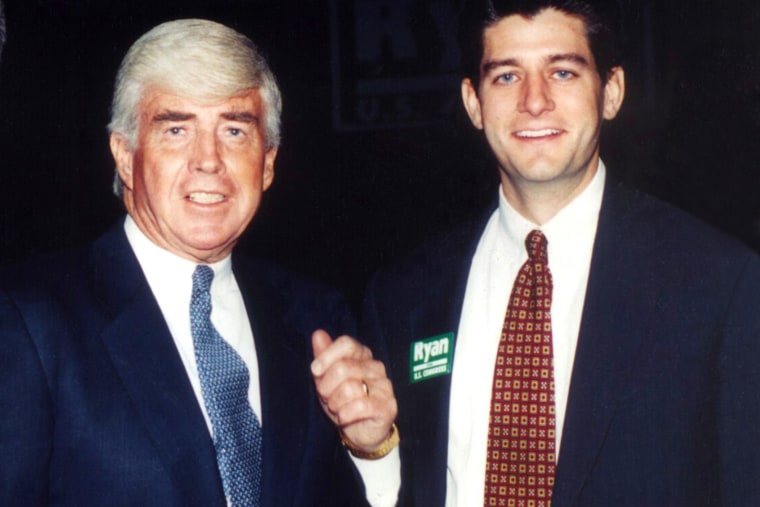Rep. Paul Ryan, I covered Jack Kemp. I knew Jack Kemp. Jack Kemp was a source of mine. Congressman, you’re no Jack Kemp.
Since the 2012 election, Ryan has been on a mission to revive the Republican party’s Jack Kemp wing. Having walked the Kemp beat for the Wall Street Journal during the Kemp wing’s purported heyday, I can report that it never existed. You don’t believe me? Consider Kemp’s dismal showing in the 1988 presidential primaries and his subsequent, vaguely poignant isolation as housing secretary for President George H.W. Bush. Kemp always hoped to create a wing within the GOP, but it never materialized.
Still, if there had beena Kemp wing, would Ryan have belonged to it? Not to judge from his proposed 2015 budget.
A likeable onetime quarterback for the Buffalo Bills who fell harder than most for the (now-discredited) tax-cutting doctrine of supply-side economics, New York Rep. Jack Kemp conveyed a concern for America’s dispossessed that was unusually heartfelt, especially for a Republican. Most of Kemp’s poverty-fighting ideas -- low-tax “enterprise zones,” privatizing public housing -- were conservative nostrums dressed up in Bobby-Kennedy-style rhetoric; when tried, none proved particularly successful. But Kemp never declared war, as Ryan has, on the welfare state. “People don’t elect Republicans to repeal the New Deal,” Kemp once said. And unlike many Republicans today (Ryan included), Kemp was repelled by the notion that the poor should be made to pay higher federal taxes.
Kemp was indifferent to a fault about budget deficits. That was mostly because he believed (against all evidence) that tax cuts would stimulate sufficient economic growth to fill government coffers. Partly, though, Kemp resisted budget-cutting because he hated the “tough love” austerity politics favored by his fellow conservatives. He preferred carrots to sticks.
Ryan, of course, is quite another story. Or rather, he has been in the past, fretting that out-of-control spending was making the U.S. “a nation of net takers versus makers.” But then, as vice-presidential candidate, Ryan watched Mitt Romney blow up his presidential campaign by publicly writing off the dread “47%.” Later, Ryan went on a listening tour to hear first-hand what low-income people had to say. Then people started calling Ryan a “moderate.” But now that Ryan has released his 2015 budget -- his last as budget committee chairman -- it is difficult to see how Ryan could have changed at all. The new budget is, National Review columnist Kevin D. Williamson observes, “very similar to his previous submissions.”
The old Ryan wanted to eliminate Obamacare. So does the new Ryan. The old Ryan wanted to voucherize Medicare. So does the new Ryan. The old Ryan wanted to cut food stamp spending by 18%. The new Ryan wants to cut it even more and turn it into a block grant to the states, a strategy that in the past has been an open invitation for states to divert money to other purposes. And so on. When Ryan ventured forth to hear testimony from the poor, did they rise up as one and shout, “slash our government benefits that we may live according to the wise precepts of Ayn Rand?” Somehow, I doubt it.
The only conceivable homage to Jack Kemp to be found in Ryan’s latest budget proposal is its use of “dynamic scoring,” an innovation that assumes implementation of the policies proposed will boost the economy and therefore lower the deficit more than would otherwise be calculated. Government actions do affect the economy, but almost never in predictable ways, so Ryan’s use of dynamic scoring renders his deficit estimates way too optimistic.
Kemp was a big dynamic scoring fan, forever determined to believe that his policies would unleash animal spirits to the nth degree. Indeed, when it came to fiscal policy, Kemp was almost deliriously irresponsible. With Ryan’s embrace of dynamic scoring, you can almost hear him say: “This one’s for you, Jack.”
Nothing else in there is.
